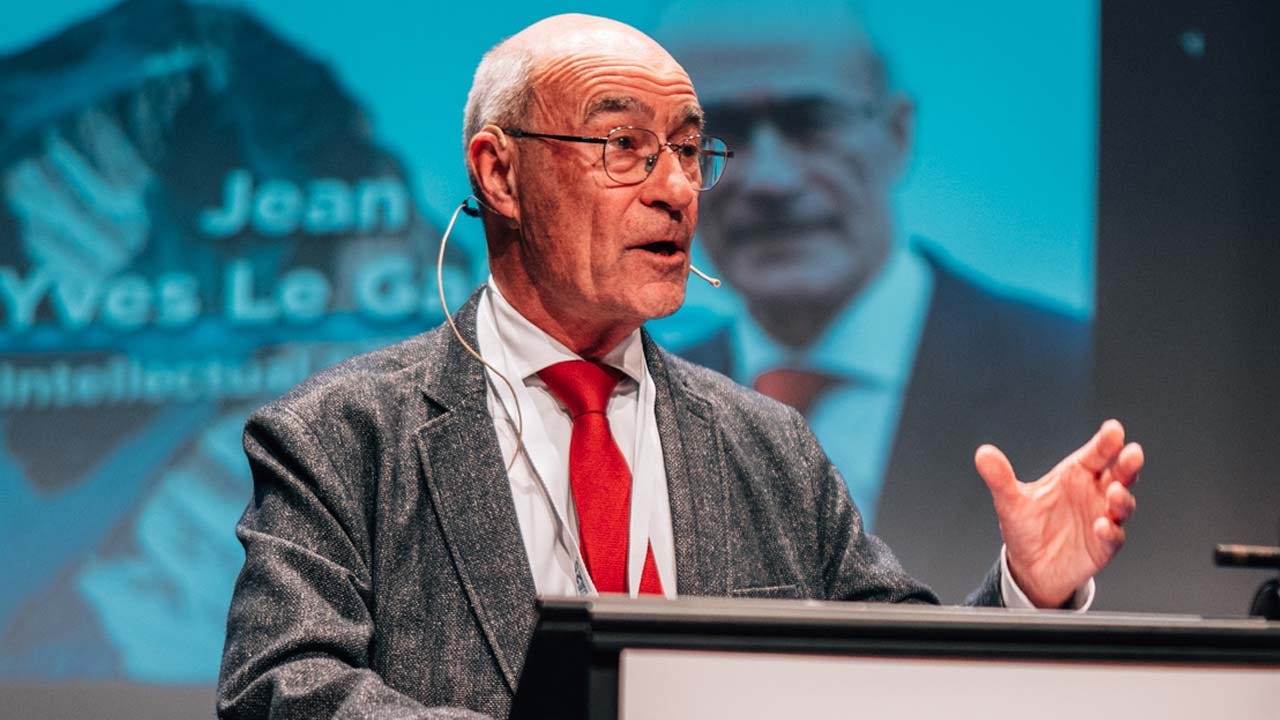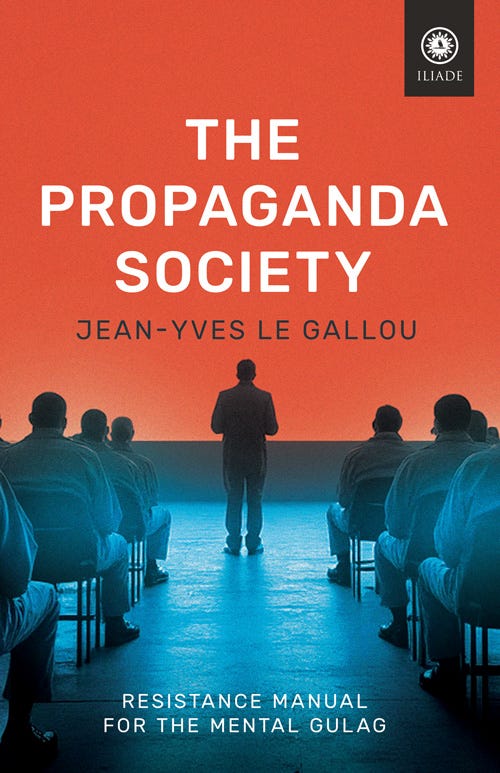Immigration: The Reserve Army of Capital
by Jean-Yves Le Gallou
In this speech given at the 12th Iliade Institute Conference on April 5th, 2025, Jean-Yves Le Gallou argues that labor immigration is a “triple error” that harms France’s present economy, near-term future, and long-term civilization. Le Gallou contends that with automation and AI transforming the job market, bringing in foreign workers for jobs that will soon be replaced by technology is shortsighted and ultimately constitutes a form of population replacement that threatens European society.
Somewhat in continuation of the previous interventions, mine begins by citing Karl Marx, a very well-known formula: the unemployed are capital’s reserve army.
In this case, Marx inscribes himself with this declaration strictly in line with the classical economists of the 18th and 19th centuries, the logic of the market as it was described by [David] Ricardo and Adam Smith.
If there is an abundant mass of available labor thanks to unemployment, then this abundant mass of labor can be paid less.
It’s quite simple as a law. It was applied very practically in France during the Pompidou years, from 1968-69 to 1973, there was a massive importation of labor immigration at a rate of 200,000 people per year.
And it was experienced very cynically, as a way to hold down wages. And so, there was a massive state policy from ‘69 to ‘73 in this direction.
Construction and public works distinguished themselves in this domain, as did the automobile industry.
The automobile industry, moreover, had mixed success with this. There was a massive importation of immigrant labor into the automobile factories of western Paris, in Flins, in Poissy.
It had mixed success for them because it delayed modernization and then there were relocations.
And today, we see, 50 years later, in this zone of Yvelines and including Villiers, Flins, Aubergenville, Poissy, there is no more work in the automobile industry, but there remain pockets of unemployment and pockets of delinquency in the second or third generation.
The lessons obviously don’t serve, since we find the same law invoked by Marx, but this time not by Karl, but by Thierry.
Thierry Marx — you hear him often in the media. He’s a media chef who spends more time behind microphones than behind stoves.
And he is the president of a powerful pro-immigration lobby called L’Union des métiers et des industries de l’hôtellerie (UMIH) (Union of Hotel Industry Trades). And they actively campaign for labor immigration, the regularization of illegal immigrants.
They actively campaign for this, with an objective that is always the same, an important economic interest, and I would say a double immediate economic interest for the restaurant and hotel industry: paying less for jobs, having more available jobs, being able to be more demanding in terms of hours or working conditions on one hand, and on the other, having markets for the hotel industry, because the hotel industry is developing today with hotels that are built to house illegal immigrants and which bring returns both in terms of construction and in terms of rent.
So, the hotel industry is today a powerful pro-immigration lobby. I find it quite amusing that its president is also named Marx… So, we find behind this a certain form of economic interest, of greed, of greed on the part of companies, but not only that.
And I believe that behind this phenomenon, there is not only the greed of companies to denounce or observe, but also to observe the greed and laziness of consumers.
Because indeed, they will tell you, if we don’t have cheap labor, we will have to charge the consumer more.
It’s true, it’s true. We find in this debate a very old debate between a society based on consumers rather than on producers.
And they will say, if we don’t have this cheap labor, we will have to charge more for the product.
Well yes, we must charge more for products if necessary. And I find that for all this, we find... both greed, but also the laziness of consumers.
Because many of these activities, which can be house maintenance activities, which can be childcare activities, which can be meal preparation activities, which can be delivery activities, why don’t consumers do them?
Very often out of laziness, because it’s easier to have things delivered, to have a meal prepared, even to have children watched or to have the cleaning done.
And so, there is a mixture behind this phenomenon of laziness and greed. Laziness because we don’t want to do the work involved and greed because on top of that, we don’t want to pay the fair price for jobs that are demanding, that are tiring and that must be properly paid.
So, I would say, to outline some paths, that what we call labor immigration, which serves somewhat in the little tune we hear today as justification for immigration in general, is a triple error.
First, it’s an error for the present, it’s an error for the immediate future, and it’s an error for the future of Western society, European society.
First for the present. It’s an error to believe, as is the official discourse, that immigration would solve the question of jobs under strain.
It’s completely false. Immigration doesn’t solve the problem of jobs under strain — it creates the problem.
It’s because there is easy and abundant immigration that there are jobs under strain for French labor or even simply resident labor, since it considerably lowers income conditions and working conditions and in a welfare state society, it becomes uninteresting to work.
But what creates the job under strain is precisely basic immigration. And moreover, you don’t need to go very far. If you go to peripheral France, if you go to Creuse, if you go to Nièvre, if you go to dozens of French departments, you will find French labor to maintain the roads, welcome clients, and clean hotels and provide restaurant service.
And so, where there is no immigration, at least not significant immigration, there is no problem with jobs under strain.
Rest assured, we will create problems with jobs under strain in these peripheral regions precisely by disseminating and distributing immigrant populations as has been the policy of successive governments for a certain number of years.
And so, the way to solve the question of jobs under strain is simply to revalue the working conditions and income conditions of these jobs under strain.
And for that, we must obviously avoid this form of drug that is immigration in its various forms.
If we project ourselves a little toward the future, it’s also an error to call upon this labor.
We’ve seen it moreover, historically, we’ve seen to what extent it was an error to bring in easy and cheap labor in the years ‘69-’74.
It did a disservice to the French economy and it continues to pose problems. For the near future, it’s also the question we must ask ourselves.
We will see, we have seen, during this day, the arrival nonetheless or the change of work or perspectives of work through the arrival of robots and the development of artificial intelligence, which will modify a good part of intellectual and organizational tasks, and even also the arrival of android robots which will also modify the perspective of material work, or the arrival of automatic vehicles which will modify a certain number of data.
Why then bring people today to perform work that will be replaced within 5 or 10 years?
This is still not taking into account the evolution of things to continue bringing people from elsewhere for jobs that will be replaced.
It’s a double great replacement. They are greatly replacing us, but they will themselves be greatly replaced. And so... we must place ourselves in a future perspective.
We also pose the question, and this is the debate on universal income: how are we going to occupy people?
If we have a problem occupying people in 5, 10 or 15 years, perhaps it is useless to bring additional people.
And then, we must keep a certain number of jobs. There are a certain number of jobs that will be kept but which don’t necessarily correspond to the jobs that the people we are bringing in can occupy.
What are the jobs that will remain? It will undoubtedly be among the subjects addressed this afternoon. Certainly highly qualified jobs, certainly qualified manual jobs, man-machine contact jobs and contact jobs between people, among themselves. Well, all of that is what must remain the prerogative of French labor, the prerogative of European labor, if only because in interpersonal relationships, it’s always easier with people who share the same culture as you than with people who have a different culture from yours.
Finally, if we place ourselves in a longer-term perspective, then here as well I will place myself in the continuation of Kaiser’s presentation.
Independent of economic interest — assuming there is an economic interest in bringing in labor immigration — we must see that in the long term, it’s a considerable upheaval.
Because labor immigration is an upheaval, it opens the right to much broader immigration, and notably in the current state of our law, on which we will undoubtedly have to return, to labor immigration.
When I spoke of the 200,000 foreign workers who entered every year from ‘68 to ‘73-‘74, that was only the start of the immigration explosion, since they were followed by family reunification, and family reunification leads to what is in fact, at least in certain neighborhoods, settlement colonization and a change of people.
And so, assuming that labor immigration would be economically founded, which I don’t believe, it would in any case be an error in terms of society and in terms of civilization.
Consequently, we must renounce this form of immigration as well as others and project ourselves into the future, into a future where employment will profoundly transform, and where bringing people today, for immediate reasons of ease and, from a certain point of view, exploitation of the labor force, is not bearable.
We must change the game and refuse all forms of immigration, including labor.
Transcribed and translated by Alexander Raynor







Without a job you will be an economic slave of the government. If you do not obey the policy and narrative of hating Russians and loving net-zero which buy the way are destroying the European economy, the banks will freeze your digital bank accounts and you will be forced to starve, steal, rebel or flee the country.
The narratives and methods of cognitive warfare and digital bank accounts are clearly a preparation for war against Russia. Our evil demonic governments must have a brainwashed population to be willing to fight in a totally unnecessary war they are destined to loose.